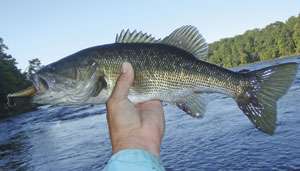
PARKSVILLE, Tenn. — Officials with the Tennessee Wildlife Resources Agency (TWRA) thought there was something, well, fishy, about the hefty spotted bass that Jack Paul Watson hauled out of Parksville Lake in southeastern Tennessee on New Year's Eve 2008. The 5-pound, 14-ounce fish was dramatically larger than the typical Tennessee spotted bass. Watson was declared (and remains) the official holder of the Tennessee state record for spotted bass, but subsequent DNA testing on Watson's fish revealed that it was, in fact, a northern Alabama-strain spot and not a native Tennessee spot.
"Until a few years ago," said TWRA fisheries biologist Mike Jolley, "there were few, if any, spotted bass in Parksville Lake. Then in 2005, a few spotted bass from the lake started showing up in our annual electrofishing surveys." Indeed, the spring 2009 electrofishing survey on Parksville Lake revealed that 69 percent of the black bass captured were spotted bass.
TWRA does not know how Alabama-strain spotted bass ended up in Parksville Lake, but they are very concerned about the future of the lake's largemouth and smallmouth bass populations. Alabama-strain spots can out-muscle other black bass species for forage resources and desirable spawning locations. They can also "hybridize" with smallmouth bass.
"Anytime a new [fish] species is introduced, it has the potential to change the way the entire ecosystem works," explained George Scholten, TWRA Reservoir Program coordinator. "These changes may seem slight at first, but over the longer term, they can result in serious problems."
However the "invaders" made their way into the lake, some Volunteer State bass fishermen are applauding the arrival of the Alabama-strain spotted bass.
"Tennessee anglers welcome the Alabama spots," said Charles Graybeal Jr., president of the Tennessee B.A.S.S. Federation Nation. "I am told that the Alabama-strain spots fight better than smallmouth bass. The bass fishermen also like how fast they grow. I know the TWRA does not like [the Alabama spots], but my club members love them."
